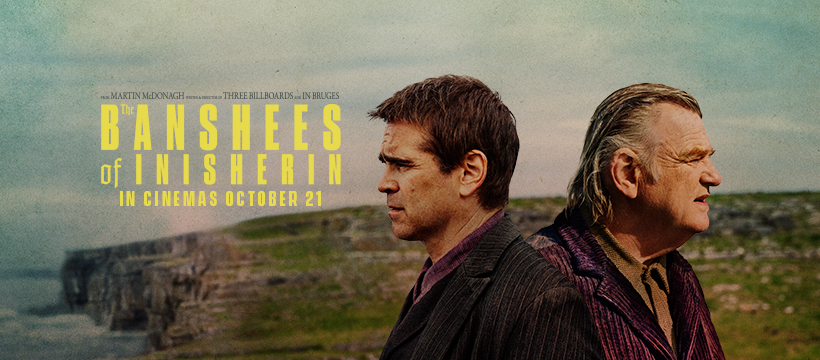
Film critic Josh Brooks finds Banshees of Inisherin to be a must-see for any lover of film, highlighting its performances and McDonagh’s writing
In Martin McDonagh’s latest film, his iconic In Bruges duo, Brendan Gleeson and Colin Farrell are reunited. However, in The Banshees of Inisherin, we are presented with the antithesis of the loving brotherhood the pair previously depicted. The film is consistent with McDonagh’s style of a dark, human comedy, but with more depth and beauty than In Bruges.
He evokes huge sympathy from the audience for Pádraic from the outset of the film, an impressive skill for a writer and director to pull off
Fiddle player, Colm Doherty (Brendan Gleeson), abruptly cuts ties with his drinking buddy Pádraic Súilleabháin (Colin Farrell). His reasoning is brutal, stating only that his former friend is ‘dull’, and that he no longer has time for dullness. Colm has become aware of his own mortality and is crippled by the thought of becoming anonymous in death. His response is to cut out the dullness (Pádraic) from his life and focus on composing his music, something he hopes to be remembered by.
As Colm memorably states, ‘absolutely no one’ is remembered for ‘being nice’, but everyone ‘knows Mozart’. Pádraic responds, ‘Well I don’t [know Mozart], so there goes that theory’; this unintentionally comic response encapsulates the way McDonagh expertly unites depth with comedy. He evokes huge sympathy from the audience for Pádraic from the outset of the film, an impressive skill for a writer and director to pull off. McDonagh also continually mirrors the conflict between the once close friends, with the sounds of the brutal civil war being fought on the mainland.
This location is fitting as the piece has qualities of an Irish fairy tale or fable, allowing McDonagh to delve into the absurd
The film is set during the 1920s on a remote, fictional island off the coast of Ireland. This location is fitting as the piece has qualities of an Irish fairy tale or fable, allowing McDonagh to delve into the absurd. This absurdity is highlighted when Colm makes the extreme threat that he will cut off a finger (an evocative threat from a fiddle player) every time Pádraic so much as talks to him. Pairing this with large, sweeping drone footage which captures the spectacular beauty of the Irish landscape, but also how exposed and bleak the terrain is, makes for a palpable atmosphere of isolation, loneliness, mortality, and death.

It could be argued that the film is slow, with little action. However, McDonagh effortlessly employs moments of dialogue, interjected with long, tracking shots, so, although the plot is slow-paced, he constantly expands upon the bleak atmosphere of the piece. Through the cinematography and pace combined, the audience feels as though they are joining the characters on their long journeys across the vast island. As you join Pádraic in his walks from the pub, to Colm’s house, and back to the pub, one can truly connect with his feelings of isolation and despair. The soundtrack further accentuates this feeling. Specifically, composer Carter Burwell’s use of bells, creates a haunting resonance to the music, building the tension immaculately.
Siobhán Súilleabháin (Kerry Condon), Pádraic’s sister is a source of intelligence and transparency
The acting in this film is stunning all-round. Gleeson skilfully portrays the stubborn, artistic Colm, with hints of the man’s previous caring nature still visible at times through the utter vulgarity he presents externally. Farrell also captures the lonely nature of Pádraic, paired with his simple-mindedness, yet endless charm. Both lead characters are flawlessly executed by the duo who, for me, surpass their In Bruges performances. Siobhán Súilleabháin (Kerry Condon), Pádraic’s sister is a source of intelligence and transparency. Condon’s depiction of the studious, quiet, yet fiery sister is magnificent. Siobhán ultimately has to make a tough decision that will damage her brother, but free her from the absurdity of his relationship with Colm, which she handles bravely.
Finally, special mention must go to Barry Keoghan for his portrayal of Dominic, the ‘village idiot’. This challenging role was masterfully executed by Keoghan. He conveys the unrelenting innocence and naivety of the character so naturally. Dominic also provides the plot with some of the most honest, and deep moments of clarity. He becomes a vessel for sanity and truth, with a vocabulary and thoughtfulness that shocks the audience, providing heartfelt observations and insight into the other characters and the narrative as a whole.
Verdict:
The Banshees of Inisherin combines a fable-like poignance, alongside beautiful darkness. Immaculately paired with comedy, which has you spending the first 40 minutes laughing out loud. The setting, writing, direction, performances, and relationships in this film create a vast array of emotions, from pure joy to existential dread. Once you recover from the melancholy of the piece, you are forced to beam in appreciation of the work of art McDonagh has created. For any lover of film, this is a must-see!
Rating: 10/10
The Banshees of Inisherin is now in cinemas
Enjoy this? Check out these other articles from Redbrick Film:
Review: Werewolf by Night | Redbrick Film
Redbrick Halloween Spooktacular 2022 | Redbrick Film
Godard Obituary – Nouvelle Vague Giant Who Transformed Cinema Dead At 91 | Redbrick Film
Comments